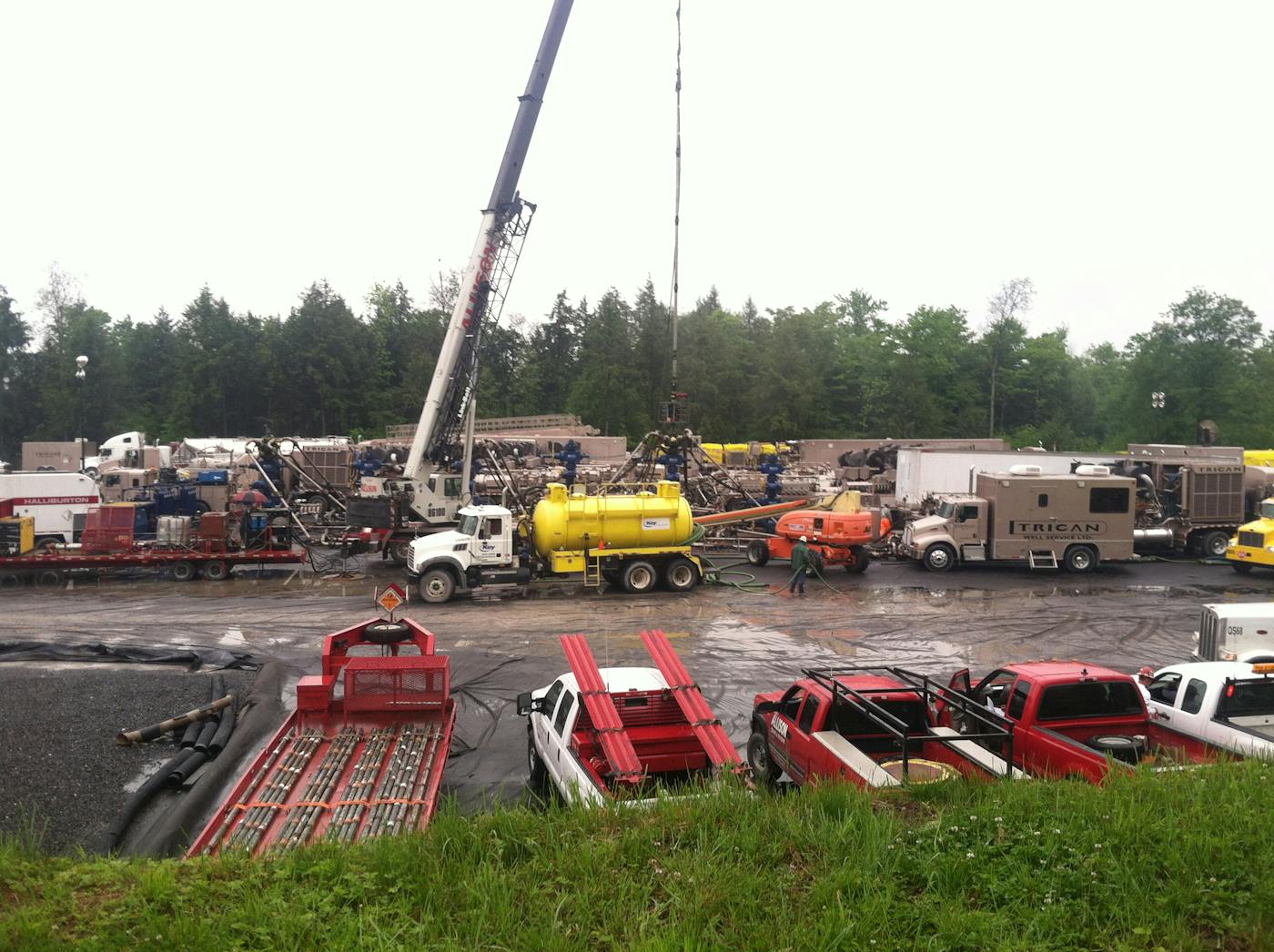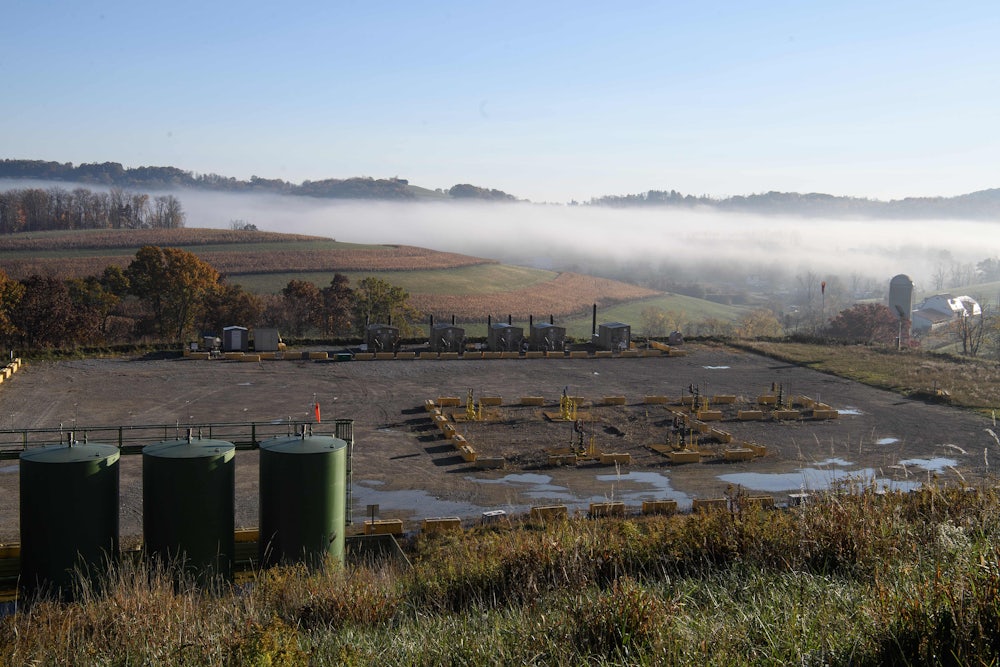When I first met George Hagemeyer in 2013, Anadarko Petroleum Corporation was in the process of drilling six natural gas wells in his backyard. America is the only country in the world where property rights commonly extend almost limitlessly beneath the surface, and George had leased his subsurface estate in the hopes of striking it rich in the fracking lottery. As a 150-foot-tall rig pounded segments of steel pipe into the earth, I asked George if he thought that anyone else should have any say over his decision to lease his mineral estate. The gas wells, after all, could degrade local air quality and harm his neighbors’ drinking water, and they were contributing to global warming. “Nope,” George responded. “It’s my land. I’ll do as I damn well please.”
George, like many other residents of Trout Run, Pennsylvania, in the Appalachian foothills, resides on a farm his father once owned. Locals with roads bearing their ancestors’ surnames can feel a sense of entitlement over their domain, and resentment toward government bureaucracies and environmentalists conspiring to regulate away their livelihoods and freedom to dispose of their land as they see fit. Leasing the land to the petroleum industry, in George’s view, is an affirmation of his sovereignty over his estate. It’s more than a little ironic that, a few years on from his decision to invite a petroleum company into his backyard, George’s complaints about the industry now echo those of Native American activists who’ve had pipelines foisted on them without so much as a by-your-leave.
When I teach classes about environmental inequality—how poor and minority communities are exposed to a disproportionate share of environmental hazards—my students and I spend a lot of time looking at movements for environmental justice, from Black residents of Chicago’s South Side resisting the placement of a trash incinerator in their neighborhood to Indigenous Karuk people fighting for the right to practice traditional ecological management on unceded land in Northern California administered by the U.S. Forest Service. These movements teach us that environmental justice isn’t just about equal protection from harm. It’s about having a say in land uses that affect you.
Lessors like George—white property owners whose ancestors “settled” land purchased from the Iroquois Nation—have voluntarily allowed fracking in their backyards and profited from it. George’s first royalty check from the gas withdrawn from under his land netted him close to $34,000. Meanwhile, communities of color from Brownsville, Brooklyn, to the Standing Rock Reservation worry that fracked gas and oil pipelines—imposed upon them without consultation or consent—will poison the water they drink or the air they breathe.
But a funny thing happened when I invited George to speak to my class at New York University. I paired him with an anti-drilling advocate from Williamsport, Ralph Kisberg, with the idea that George would represent the pro-fracking perspective. However, when it was George’s turn to speak, he dedicated most of his time to complaining about the industry. A truck spilled transmission fluid on his driveway. The incessant caravans of big rigs ruined the rural tranquility he held so dear. The wellpad was far larger and more disruptive than he had expected, and it sometimes emitted foul odors that forced him to close his windows. And so on.

More than anything else, the issue for George was consent. He didn’t know the gas company could post a security guard at his driveway. He only learned that Anadarko planned to withdraw thousands of gallons of water per day from his stream when he read the classified ad the company was required to run in the local newspaper. “They don’t tell me anything,” George griped. “Granted, they’re leasing the property. But now wait a minute! Shouldn’t you have somewhere in the agreement something saying that you can’t do anything you damn well please on my property without having my permission?” The last straw was when the security guard stationed at the top of George’s driveway warned him that he could be arrested for trespassing on the wellpad in his own backyard; a hidden camera had recorded George walking across the pad. George complained to the site manager, but to no avail. He had, in effect, become a tenant on his own property.
As we looked at pictures of the massive industrial installation in his backyard, a student asked George if he ever looked at his property and said, “This is not the land I recognize.” George muttered, “Yes, I do.” Another asked if George regretted leasing. George nodded. “What would my daddy say if he saw the way they used this land?” he said. “They want you to think you don’t have any rights.” What George unwittingly signed away was, he realized, worth more than the royalties he earned from those gas wells.
Heartland residents like George who live close to oil and gas wells are less likely to support anti-fracking policies than people who live in places where fracking is not occurring (e.g., cities). However, there’s evidence that petroleum companies are losing public support—what’s sometimes referred to as their social license to operate.
New York banned fracking back in 2014; California just announced it will ban new drilling permits by 2024. Industry jobs are evaporating. Royalty checks are dropping commas. Chesapeake Energy recently reached a $5.3 million settlement over charges that it “underpaid royalties and used deceptive practices to secure leases with Pennsylvania landowners” by illegally colluding with Anadarko to fix the price of leasing bonuses, a practice that enraged George—who was a party to the suit—and many others in his community. Fracking has been increasingly linked to health maladies and water contamination, sparking public demands for greater oversight of the industry. In 2020, a statewide grand jury investigation concluded that Pennsylvania regulators “did not do enough to properly protect the health, safety and welfare of its citizens.”
Support for fracking is waning in Pennsylvania, with a slim majority now opposed to the industry. Some towns have taken matters into their own hands, defiantly enacting local bans or restrictions on fracking infrastructure even as the industry—and their own Department of Environmental Protection—sues them on the grounds that there’s no constitutional right to local self-government regarding fracking. (On the corporate side, investment funds and endowments are divesting from fossil fuels en masse.)
Over the past few years, many of the “true believers” I befriended in Greater Williamsport have become disaffected with the petroleum industry. This situation creates an opening for environmentalists to find common cause with landowners like George. Many environmental activists’ emphasis on greater government restrictions on fracking is a nonstarter for people who distrust bureaucracy and don’t like the idea of outsiders telling them what they can and can’t do on their property. But that’s not necessarily the only approach to curtailing the industry’s power.
Most major oil and gas producing states (e.g., Pennsylvania, Texas, Colorado) have, as a result of industry lobbying, taken away the traditional right of communities to regulate land uses like fracking locally through mechanisms like zoning. Ironically, it is legislatures dominated by Republicans—who purport to favor civic association over government regulation—that have disallowed “home rule” over fracking. When it comes to setting the terms of the lease, the industry holds all of the cards; lessors are ill equipped to push back against what many landmen (lease brokers) deceptively called “standard” leases (there is no standard lease).
A few years ago, George began to turn up occasionally at Board of Supervisor meetings in neighboring townships to offer testimony about how the gas industry had taken over his estate. He even floated the idea of temporarily halting permits for new gas wells until the scales were tipped more in favor of landowners’ rights. But his elected local leaders’ hands are tied by the state.
If anti-fracking activists articulated policies that harmonized with what people like George (white, land-owning, frequently leaning conservative) see as “rural values” (like the libertarian principle that one’s home is one’s castle and a belief in highly localized community control over anything that might affect that castle), they could, I believe, bring people like those in Greater Williamsport on board. This is in fact the approach, in admittedly a very different context, that many environmentalists support when it comes to Native nations: The management of resources on tribal lands should be Indigenous-led. Honoring private property rights and supporting locally led resource management is also a cornerstone of President Biden’s new “American the Beautiful” conservation plan.
Rural Americans’ and Native Americans’ desire for sovereignty over land-use decisions regarding fracking stem from distinct, unequal, and troubled histories; to be clear, any such libertarian-environmentalist coalition against the fracking industry would be a very uneasy alliance, built on temporary overlap between groups whose interests may not align in any other way. (Notably, the same could also be said of rural landowners and the corporate power center of the Republican Party, who are united on little beyond culture wars.) But the fact that these two very different groups are demanding the same thing in their battles with petroleum companies highlights some broader truths about the fossil fuel industry: Contrary to oil and gas firms’ pitch whenever they move into a new territory, they’re not especially interested in helping the local population or respecting the land. Sooner or later, locals are going to find themselves fighting to maintain control over their ancestral homes against companies hell-bent on exploiting the earth and its inhabitants.
George isn’t opposed to fossil fuel extraction per se, nor is he convinced that climate change is real. What he shares with many environmental justice and Native rights groups is a love for the land, a belief that people should have a say over land uses that impact them, and a grudge against the fossil fuel industry for trampling over people’s right to self-determination. In what often feels like a literal battle to the death with petroleum companies, maybe environmentalists could work with that. And as the modern conservative movement has repeatedly shown, many political alliances have been built on less.
